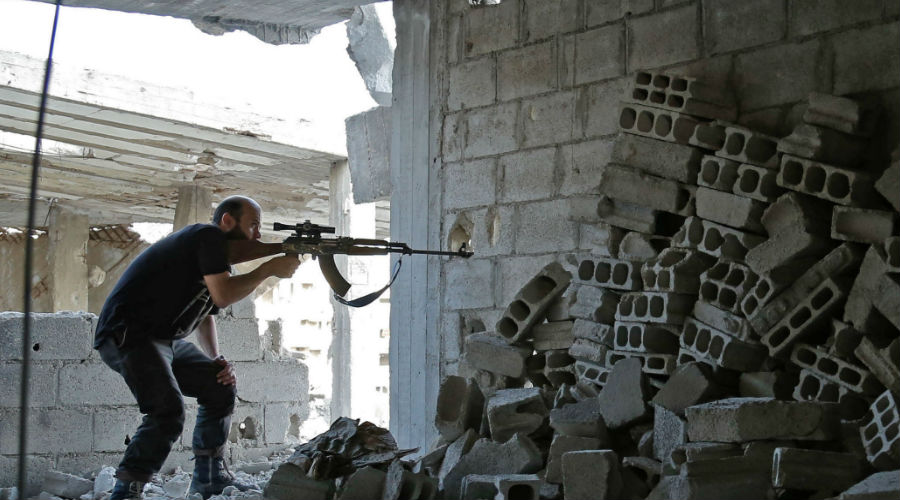The February 24 United Nations Security Council’s Resolution 2401, which demands a 30-day cessation of hostilities in Syria, is facing no easy obstacles, especially in light of disagreement on the start of its implementation and geographical scope. Most importantly, the resolution affirms that the cessation of hostilities would not apply to military operations against terrorist organizations such as ISIS, al-Qaeda and al-Nusra Front, also known as Jabhat Fateh al-Sham.
No doubt, this is in part due to divergent positions, and policies of local parties and regional and international powers involved, on the potential developments and trajectories of the ongoing conflict in Syria. This followed a recent escalation of armed confrontations between the Syrian regime forces and opposition forces in Eastern Ghouta near the Syrian capital Damascus. The development caused certain parties to voice doubts about the ability of the new UN resolution to back possible efforts towards a settlement of the crisis in Syria in the coming period.
Special Significance
Eastern Ghouta is one of the four “de-escalation zones” agreed on by Russia, Iran and Turkey in May 2017. Then, the Russian Defense Ministry announced that the situation was de-escalated in the area and humanitarian aid convoys were allowed access in preparation for a new round of talks aimed at reaching a political solution. But later, escalation took place in the area when fighting broke out once again between the Syrian regime forces and opposition forces, preventing the implementation of the de-escalation agreement.
Recently, the Syrian regime forces launched a large military offensive to seize control of Ghouta, a sign that is paying special attention to win the battle at this particular time. The outcome would directly impact balance of power or whatever political arrangements that will be made in the next stage.
Various Reasons
Military escalation in Eastern Ghouta was not unlikely. It was expected, especially because several parties involved in the conflict are seeking to control the area, which has a strategic geographical location of high military significance that can contribute towards tilting the balance of conflict in favor of whatever party capable of seizing control of the ground. In addition to being situated between the capital and Homs province, Eastern Ghouta is at the crossroads of all Syrian provinces. Moreover, it is part of the Syrian political capital, closer to the strategic overland corridor that Iran plans to construct to ensure continuous flow of supplies to allied Hezbollah militia in Lebanon.
Most importantly, Eastern Ghouta is the last major opposition stronghold, and regaining control of it would enable the regime to consolidate gains made over the past period, including seizure of large swathes of territory and protecting the capital.
The recent battles broke out when the regime forces were advancing on the perimeter of Damascus. According to several views, if its military operation in Eastern Ghouta turns out to be a success, the regime is likely to continue its other operations in Raqqa and then Idlib provinces. This is what makes Eastern Ghouta strategically important.
No doubt, retaking Eastern Ghouta will effectively contribute towards changing political arrangements likely to be made in the future, depending on potential impacts on talks about Syria in both Geneva and Sochi.
Russia’s persistent push to impose its preferred solution, which is to maintain al-Assad regime in power and consolidate its rule, has delayed the adoption of the recent UN Security Council’s resolution on Syria. At the same time, the Assad regime is trying to make other gains from its military operation, in particular to put stronger pressure on Turkey. Significantly, the regime’s offensive in Eastern Ghouta coincided with Turkey’s advances in Afrin where the Turkish artillery fired warning shots at pro-regime militias attempting to enter the city to force them to retreat. Later, Turkish President Recep Tayyip Erdogan warned that his country will not allow any armed group to enter Afrin.
Potential Trajectories
Complexity and intertwining of the interests of powers involved in the conflict do impose three potential and perhaps contrasting trajectories or scenarios for the battle for Eastern Ghouta, even after the adoption of the recent UN Security Council resolution.
In the first scenario, the possibility that the regime succeed in regaining control of Eastern Ghouta is backed by division between the opposition armed groups in the area. In the past months, military escalation and fighting erupted between the Jaish al-Islam, on the one hand, and the Faylaq al-Rahman and al-Nusra Front, on the other, in an intensified struggle for influence and sources of funding. Jaish al-Islam controls about 53 per cent of Eastern Ghouta, while Hay'at Tahrir al-Sham, Faylaq al-Rahman and Harakat Ahrar Al-Sham jointly share the remaining area.
According to several views, due to different interpretations of Resolution 2401, military confrontations may continue in the coming period.
In a second scenario, the battle for Eastern Ghouta continues without an end in sight, especially in the event that the UN Security resolution is not implemented. Taking into account that these armed groups have better human capabilities and combat skills than other groups in Syria, the possibility that they will be able to counter the regime’s offensives cannot be ruled out. This will mean that any progress by the regime forces will be limited.
In the third scenario, al-Assad regime is defeated and the current situation continues unchanged. This trajectory is possible if foreign military forces intervene changing the balance of power against the regime. But this possibility is currently ruled out despite escalating U.S. threats. This means that armed groups operating in Eastern Ghouta will receive only indirect support to counter the regime forces.
Overall, due to the several potential trajectories and conflicting interests, efforts being made to reach a settlement to the conflict in Syria continue to face major challenges, even after the unanimous adoption of the UN Security Council Resolution 2401.


